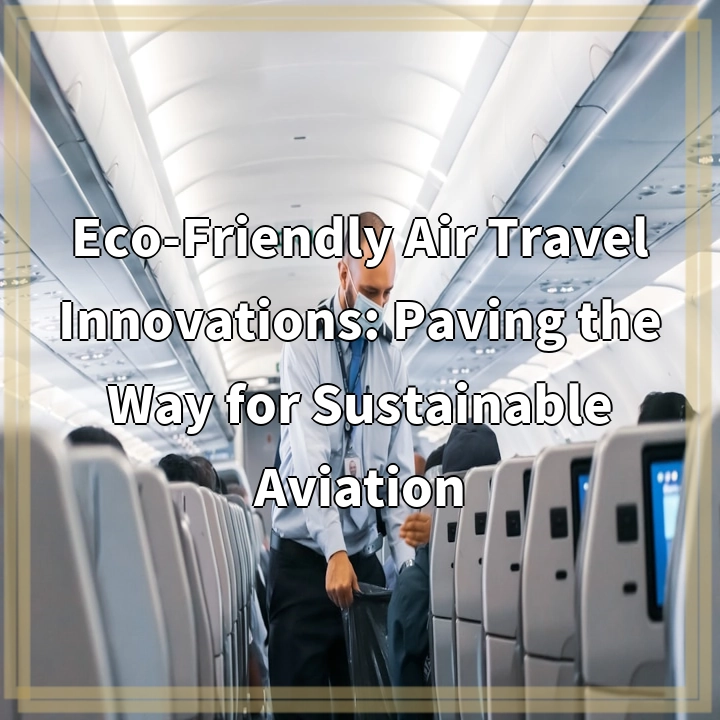
What it is:
Eco-friendly air travel innovations refer to the advancements and practices aimed at reducing the environmental impact of aviation. These innovations include the development of sustainable aviation fuels (SAFs), electric and hybrid aircraft, advancements in aerodynamics, and operational efficiency improvements. The aviation industry is under increasing pressure to minimize greenhouse gas emissions and improve fuel efficiency, making such innovations essential for sustainable air travel.
Sustainable Aviation Fuels
Sustainable aviation fuels are derived from renewable resources such as biofuels, waste oils, and synthetic sources. These fuels can significantly reduce lifecycle carbon emissions compared to traditional fossil fuels. Airlines worldwide are beginning to integrate SAFs into their operations, showcasing a commitment to greener travel options.
Electric and Hybrid Aircraft
The development of electric and hybrid aircraft represents another exciting frontier in eco-friendly air travel. These aircraft aim to decrease reliance on fossil fuels, leading to lower emissions and quieter flights. Companies and startups are actively testing prototypes, with some expected to enter service in the coming years.
Real-World Problems
Despite the promise of these innovations, the aviation industry faces several real-world challenges in implementing eco-friendly air travel solutions. One significant issue is the current reliance on traditional jet fuels, which poses a significant barrier to the widespread adoption of sustainable aviation fuels. While SAFs exist, they are not yet produced at scale or cost-competitive with conventional fuels.
Infrastructure Development
The transition to electric and hybrid aircraft also requires substantial infrastructure changes. This includes the development of charging stations at airports and the need for new maintenance protocols, which can be costly and time-consuming for airlines to implement.
Regulatory Hurdles
Furthermore, regulatory challenges can slow down the implementation of eco-friendly technologies. Governments may lack clear policies or incentives to promote the use of sustainable fuels and aircraft, hindering investment and innovation in the sector.
Public Perception and Demand
Lastly, there is the challenge of public perception and demand. While awareness of climate issues is growing, many travelers still prioritize ticket price and convenience over environmental sustainability. Until eco-friendly options are seen as the norm rather than a niche preference, the adoption of innovative technologies may remain limited.

Solutions to Eco-Friendly Air Travel Innovations
To address the challenges associated with eco-friendly air travel innovations, several solutions can be implemented that promote the adoption of sustainable practices within the aviation industry.
Scaling Sustainable Aviation Fuels
One of the primary solutions is to increase the production and availability of sustainable aviation fuels (SAFs). This can be achieved through government incentives, funding for research and development, and public-private partnerships to promote SAF production facilities. By lowering production costs and improving supply chains, SAFs can become more competitive with traditional jet fuels.
Investing in Infrastructure
Developing the necessary infrastructure for electric and hybrid aircraft is crucial. Airports should invest in charging stations and training programs for maintenance crews to safely handle new technology. Government regulations can support this transition by offering grants and incentives for airports that enhance their infrastructure to accommodate eco-friendly aircraft.
Creating Supportive Regulations
Regulatory frameworks need to encourage innovation in sustainable aviation. Governments can implement policies that provide tax breaks for airlines that adopt eco-friendly technologies and fuels, as well as expedite the certification process for new aircraft types. Such supportive frameworks can drive investment and accelerate the adoption of greener solutions.
Raising Public Awareness
Increased public awareness and education about the environmental impact of air travel can help shift consumer preferences. Educational campaigns can highlight the benefits of sustainable travel options, encouraging travelers to prioritize eco-friendly choices. Airlines that market their commitment to sustainability can attract environmentally conscious consumers and build brand loyalty.
Fostering Industry Collaboration
Collaboration across the aviation industry—including airlines, manufacturers, fuel suppliers, and policymakers—is essential to effectively address challenges. Sharing best practices, pooling resources, and aligning goals can advance the implementation of eco-friendly air travel innovations and foster a culture of sustainability across the sector.















